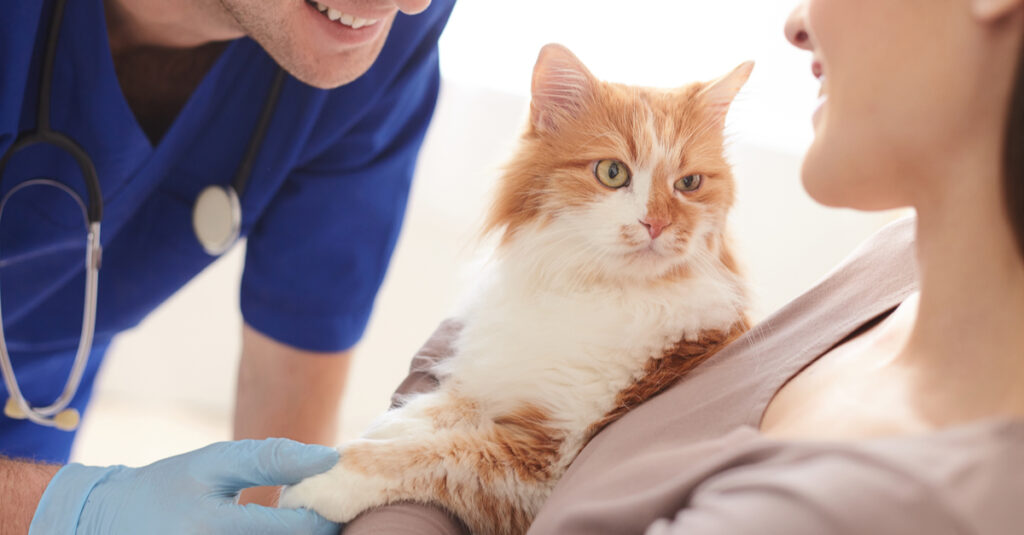Can a Cat Die from Neutering? All You Need to Know
Neutering is the process of removing a male cat’s testicles. It is usually done to stop the cat from reproducing. But neutering can also prevent the spread of disease and make the cat less likely to spray and fight with other male cats.
The risks associated with neutering are rare, but they’re not unheard of.
Grab the Puuurrr-fect Planner to keep track of your cat’s health and well-being ON SALE NOW!
If you have concerns about your cat dying from neutering, it’s important to know that these risks are very rare. The American Society for the Prevention of Cruelty to Animals (ASPCA) estimates that there are only about 6 deaths per 10,000 procedures performed.
Now, that is a very small risk compared to other medical procedures.

If you’re worried about your cat dying during surgery, talk to your vet about ways to minimize these risks.
Risks include infection at the site of surgery, which can be treated with antibiotics. Your cat may also have a reaction to the anesthesia used during surgery.
This is rare in cats but could cause breathing difficulties or collapse if left untreated.
After any surgery, it’s important for your cat to have a checkup with his vet so he can monitor any changes in behavior or appetite.
Also read: Why Is My Mom Cat Hissing at Her Kittens? [Surprising Facts
What To Expect After Neutering Cat?
A cat’s recovery from neutering is usually pretty quick, but it can be a bit sore for a few days.
It is normal for your cat to feel a little sore and stiff after surgery. Some cats are more active than usual in the days following surgery, but most will rest for the first day or two.
Following surgery, your veterinarian will give you pain medication to give your cat at home. If your cat is not eating or drinking, contact your veterinarian for advice.
The following are often normal effects of neutering, and you should not be worried.
Pain and swelling. Your cat will be a little sore and swollen for a few days after surgery. If you notice any bleeding or discharge from the incision site, call your vet right away.
Loss of appetite. Some cats lose their appetites after surgery, but this is normal and shouldn’t last long, usually about 24 hours.
If it’s longer than that and your cat isn’t eating normally, take him or her to see the vet again right away.
Nausea and vomiting. Some cats vomit after being anesthetized for spaying or neutering, but this usually stops within 24 hours of surgery as well.
After neutering surgery, your cat may have difficulty urinating or defecating because of swelling near the site of incision.
This usually resolves itself within one week following neutering surgery if given time to heal and does not require any treatment.
Your veterinarian will provide specific instructions on caring for your cat after neutering surgery including:
How Often Do Cats Die from Neutering?
According to the ASPCA, the overall risk of death from surgery is less than 1%.
The death rate from surgery is very low, especially in a healthy cat. The most common causes of death following surgery are infections.
Even though the risk is fairly low, it’s still important to understand what might cause a cat to die after this procedure so you can make sure your pet remains healthy after being neutered.
The risk of death can vary depending on the age and the existing condition that the cat has before the procedure. That explains why your vet will examine your cat before the procedure can be carried out on him.
In addition to this type of surgery performed, there are other factors that can increase your cat’s risk of death during or after surgery. These include:
- Age: senior cats may be more likely to die during or after surgery. Thats because they are more likely to have underlying health problems that make them less resilient during an operation.
- Weight: An overweight cat may be more prone to complications during anesthesia than a slimmer one. That is because his organs will take longer to stop functioning properly after being exposed to anesthetic drugs. Anesthetic drugs are given to depress their activity temporarily while he lies still under its influence
Cat Died During Neutering
If your pet died during neutering, you may be wondering what happened and what you can do about it. Did the doctor do something wrong?
Does this mean that others should be worried about their pets’ safety during surgery?
It’s important to remember that vets do their best to avoid complications. However, there are no guarantees when it comes to surgery and anesthesia.
Even in human medicine there are things that can go wrong during an operation that we can’t always anticipate or prevent.
However, if your cat dies during neutering, it can be due to any number of reasons:
The cat was too old or ill and had a weak immune system.
The anesthesia used wasn’t strong enough, so the cat didn’t go under properly.
There was an issue with the surgery itself, maybe it was performed incorrectly or there was a complication during the procedure.
Cat Died Days After Neutering
The post-neutering syndrome is a very rare complication after neutering. The most common cause of death is the rupture of the testicle during surgery, which causes a fatal infection.
The problem seems to be most common in cats that are overweight or have other health problems.
If your cat dies shortly after being neutered, it’s possible something might have gone wrong during surgery. Or that he might have had a health complication that was left undetected.
For example, if he had an undetected heart condition and it caused him to go into shock during surgery, it could explain why he died so soon after being taken home from the vet’s office.
If you think your cat died due to its neutering surgery, contact your veterinarian right away. Your vet will typicallycan investigate what happened.
They’ll need to know all of the facts surrounding the incident . IN addtion they will probably want to examine your pet as well.
Can A Neutered Male Cat Still Get a Female Pregnant?
No, a neutered cat cannot get a female pregnant. Neutering is the removal of the testicles, which are where sperm are produced. Therefore, it is impossible for a neutered male cat to be fertile.

There are many myths about male cats getting females pregnant; however, this is not true unless the male has not been neutered. A neutered cat has no testicles and therefore cannot produce sperm.
Neutering prevents undesirable behaviors such as marking territory with urine and fighting with other cats, but your male cat may still try to mate with other cats in heat or even become aggressive towards you if he’s not neutered yet
Negative Effects of Neutering Cats
After a male cat has been neutered, he will no longer produce sperm or be able to impregnate a female cat.
Neutering cats makes them vulnerable to predators because they cannot defend themselves due to lack of testosterone.
Testosterone makes cats aggressive and more defensive, but because of neutering, the hormone testosterone is no longer available to trigger the cat with such behaviors.
Neutering cats can also cause a decrease in the metabolism. It can lead cats to being obese. As well as having urinary tract complications later on
In addition, neutered males are less likely to exhibit territorial aggression than unneutered males because they don’t have the same urge to mark their territory with urine or feces.
Pain following neutering may cause your pet to become more irritable than usual, especially when you’re trying to handle him or her after surgery.
This increased irritability may last for up to two weeks after the procedure; during this time, you should avoid handling your cat unnecessarily especially if he or she seems particularly irritated.
So that you don’t stress him or her out too much and make recovery harder on both of you.
What Is the Best Age to Spay a Cat?
The best age to spay a cat is around 4 months old or approximately between 4-5 months. This is when the female cat is old enough to have a heat cycle, but not so old that she has already had one or more litters of kittens.
Spaying your cat before her first heat cycle helps prevent unwanted pregnancy and the health risks associated with it.
When you spay your young cat, it will be easier for her to adjust to her new life without having to worry about pregnancy and birth.
This procedure can also prevent some diseases from developing later in life, such as uterine cancer.
Why You Should Consider Getting Your Cat Spayed As Soon As Possible.
- Spaying helps prevent unwanted pregnancies and health problems in cats.
- It’s safer for the cat if it’s done before it’s fully grown, especially the reproductive organs.
- If you get your cat fixed early, it will be less likely to roam outside and get hit by cars or attacked by other animals like dogs.
- If you don’t get your cat spayed until later in life, it could experience long-term health issues that could have been avoided if it had been done earlier on in life.
- Spaying is more affordable if done at an early age because there aren’t any complications that come up later on in life. Like there would be with an older animal who was just recently spayed or neutered after being sick for a while first!
Read Also: How Often Do Cats Get Sick?
How Do I Know If My Neutered Cat Is Infected?

There are a number of illnesses your cat can suffer from after the neutering procedure. And these infections can vary depending on how the procedure was carried out. Or what your cat was exposed to after the surgery.
The most common way to know for sure that your cat has an infection is when you take it to a vet, and they test the cat’s blood. A positive result will mean that the cat has tested to an infection.
Neutering won’t protect your cat from all infections or diseases, but it will protect him from many sexually transmitted diseases that can be serious or fatal.
One of these is feline venereal disease (FVD). The bacteria that cause FVD live in the genital and anal areas of both male and female cats.
They can infect any part of the body through sexual contact, sharing food bowls or litter boxes, or even through mutual grooming.
Once infected with FVD, your cat will have symptoms such as inflammation and discharge around his genitals, anus or mouth.
And increased thirst and urination. You may also see bumps on his skin that contain pus when scratched open with a fingernail.
Is 2 Years Old Too Late to Neuter a Cat?
2 years old is not too late to neuter a cat simply because the operation can still be done. However, it is not not a good idea to wait until your cat is older. Neutering a cat at an age like 2 years old can cause some complications on the cat.
Neutering a cat at any age can help prevent behavior problems, such as spraying and aggression. It also helps prevent certain types of cancer, such as testicular cancer in males and ovarian cancer in females.
However, there are some downsides to neutering your cat later in life:
- The procedure itself may be more complicated if the animal is older than two years old
- If you wait until your pet is two years old, he or she will have gone through puberty and will no longer be physically immature
- You may experience increased aggression from your pet if you wait this long to neuter them.
What Age Do Male Cats Start Spraying?
Male cats spray because they have a hormone called testosterone. As they age, they produce more testosterone and start to spray.
Male cats start spraying at around six months old, but it can happen as early as four months old.
Spay or neuter him before he reaches puberty because this will reduce the amount of testosterone in his body and make him less likely to spray in the first place!
If your cat starts spraying before you neuter him, here is a tip to help weaken that offensive smell;
Clean up any messes immediately so that the smell doesn’t linger around for long periods of time and cause more problems down the line (such as more spraying).
Read also: Why My Cat Had Kittens but Still Looks Pregnant
Conclusion
Neutering a cat is a surgery that is performed to help prevent overpopulation and other health risks in cats.
Many pet owners often desire this processes, but as with any surgery, there are risks that come with it. The health department classifies these risks are rare.
However, there have been cases where the cat has died after the surgery, most likely due to either reaction to general anesthesia or the surgical incision.
Cats are more likely to have complications from neutering if they have serious health problems to begin with, so it’s important to discuss your cat’s health condition with your vet before taking this step.
https://vcahospitals.com/know-your-pet/neutering-in–cats
https://www.petmd.com/cat/care/what-age-should-you-spay-or-neuter-your-cat
